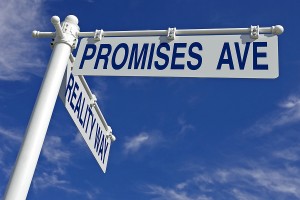|
|
 That’s the age-old question, isn’t it?
That’s the age-old question, isn’t it?
When you think about everything we’ve experienced in the last decade and a half – from the Y2K scare to 9/11, Iraq and then the recession – no wonder that a certain level of insecurity about the future has become a permanent part of our psyche as we ease into 2013.
What today’s consumers want most today is security and contentment. No doubt these wants are being shared by people’s economic outlook and circumstance, which most categorized as uneasy.
Interestingly, here are some other key needs that our consumers expect brands to help them fulfill. If you can help make one or more of these needs a reality – you will earn their business and their loyalty.
Security: Food, shelter, keep my house, increase my savings, bolster my retirement plan, a corporate job, being part of a movement but not a sole anarchist
Control: Frugality, effective money management, black and white answers that come from scientific pursuits, own business/entrepreneurship, self reliance (especially younger Millennials)
Consistency: Stable employment, stay at college, complete college
Proving self-worth: Value through charity work, striving to get promoted, finding a way to leave a legacy (Baby Boomers), training/learning something new rather than leisure time, constant resume buffering (especially Millennials), aggressive pursuit of success (older Millennial males in the US)
Honoring my needs first: Protecting my health, making healthier friendship and relationship choices, spending more time with people who have my genuine interests at heart, valuing private information more (Millennials)
Respect for others (but only if they show respect for me first): Rejection of greed and self-serving society as demonstrated by governments and corporations, helping others through volunteer pursuits
Liberty: Personal independence, time for me (Baby Boomers), take control of my investments (Baby Boomers), not oppressed/restricted by others schedules or technology
Progress: Pursuit of scientific invention and learning, further education, choice of foundations, supportive of organizations who take society forward in some way
Both Millennials and Baby Boomers believe leadership brands that are sincere and transparent have the ability to encourage them to bring out the best of themselves and progress society. In the absence of strong government and other institutional leaders, people anticipate, and may even demand, that brands step in and play the role of cultural reformers.
Here’s my take on this. Our marketplace is asking us to be much more than a seller of stuff. They’re expecting us to step up and inspire our internal team and our customers to work together to take charge of the problems facing our world. Think of it as corporate social responsibility – but on steroids. It’s not enough to write a check anymore – we have to also be willing to give our ideas, our passion and our sweat equity.
Think about how this might change the way you communicate about your company and the work you do. Think about how you could build a community of raving fans who don’t just talk about what you sell but more important – talk about what you believe.
Interesting times ahead.

